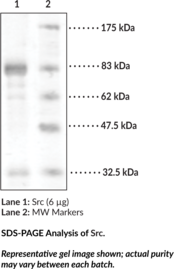Territorial Availability: Available through Bertin Technologies only in France
- Correlated keywords
- Protooncogene Tyrosineprotein cSrc pp60csrc p60Src SchmidtRuppin SRC 1 SH 3 2 1 Cterminal Nterminus Avian Sarcoma (Schmidt-Ruppin A-2) Viral Oncogene Homolog SRC1
- Product Overview:
Src is a non-receptor protein tyrosine kinase, and SRC, which encodes Src, is considered a protooncogene.{58189} Src is composed of unique, SH3, SH2, linker, and SH1 protein tyrosine kinase domains, and a C-terminal regulatory tail. It is ubiquitously expressed with higher levels in the brain, osteoclasts, and platelets. Src is myristoylated at the N-terminus during biosynthesis, a modification which facilitates its attachment to membranes. It primarily localizes to the plasma membrane where it interacts with receptor tyrosine kinases involved in cell division, growth, migration, and survival, as well as to the perinuclear membranes, endosomes, and secretory vesicles. It exists in an autoinhibited state and is activated by receptor tyrosine kinases, such as PDGFR, autophosphorylation at tyrosine 419, dephosphorylation of negative regulatory residues, or certain mutations.{58189,58190} Src protein levels and activity are elevated in a variety of cancers and are positively correlated with the degree of malignancy.{58190} An activating truncation mutation in SRC is associated with highly metastatic forms of colon carcinoma.{58190} Cayman’s Src (human, recombinant) protein can be used for enzyme assay applications. This protein consists of 536 amino acids and has a calculated molecular weight of 86 kDa.
Cayman Chemical’s mission is to help make research possible by supplying scientists worldwide with the basic research tools necessary for advancing human and animal health. Our utmost commitment to healthcare researchers is to offer the highest quality products with an affordable pricing policy.
Our scientists are experts in the synthesis, purification, and characterization of biochemicals ranging from small drug-like heterocycles to complex biolipids, fatty acids, and many others. We are also highly skilled in all aspects of assay and antibody development, protein expression, crystallization, and structure determination.
Over the past thirty years, Cayman developed a deep knowledge base in lipid biochemistry, including research involving the arachidonic acid cascade, inositol phosphates, and cannabinoids. This knowledge enabled the production of reagents of exceptional quality for cancer, oxidative injury, epigenetics, neuroscience, inflammation, metabolism, and many additional lines of research.
Our organic and analytical chemists specialize in the rapid development of manufacturing processes and analytical methods to carry out clinical and commercial GMP-API production. Pre-clinical drug discovery efforts are currently underway in the areas of bone restoration and repair, muscular dystrophy, oncology, and inflammation. A separate group of Ph.D.-level scientists are dedicated to offering Hit-to-Lead Discovery and Profiling Services for epigenetic targets. Our knowledgeable chemists can be contracted to perform complete sample analysis for analytes measured by the majority of our assays. We also offer a wide range of analytical services using LC-MS/MS, HPLC, GC, and many other techniques.
Accreditations
ISO/IEC 17025:2005
ISO Guide 34:2009
Cayman is a leader in the field of emerging drugs of abuse, providing high-purity Schedule I-V Controlled Substances to federally-licensed laboratories and qualified academic research institutions for forensic analyses. We are certified by ACLASS Accreditation Services with dual accreditation to ISO/IEC 17025:2005 and ISO Guide 34:2009.





